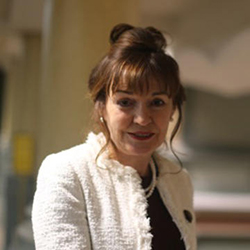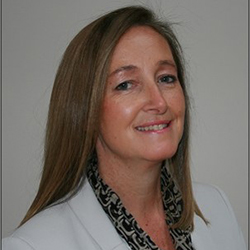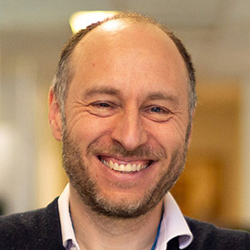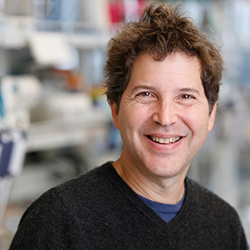The Inaugural Lecture: Finding the Right Balance – from rare gases to rotary motors
February 2018
Professor Dame Carol Robinson DBE FRS FMedSci FRSC
Professor Dame Carol Robinson holds the University Chair of Dr. Lee’s Professor of Chemistry and is the first Director of the Kavli Institute for Nanoscience Discovery at Oxford.
She is recognised for establishing mass spectrometry as an innovative technology to study the structure, function and interactions of proteins and their complexes.
Her collaborations span both academic and industrial laboratories and in 2016, her spin-out company, OMass Technologies, was founded. Now trading as OMass Therapeutics the company uses high definition native mass spectrometry to develop drug therapies for use in immunologic and genetic disorders.
Carol graduated from the Royal Society of Chemistry in 1979 and completed her PhD at the University of Cambridge. She took a career break of eight years to bring up her children and later became the first female Professor of Chemistry at the University of Cambridge (2001-2009).
She has held the Dr. Lee’s Chair in Chemistry since 2009 and is Oxford’s first female Professor of Chemistry. Her work has attracted over twenty awards and prizes including most recently, the Othmer Gold Medal from the Science History Institute (2020), Royal Medal A from the Royal Society, Novozymes Prize from the Novo Nordisk Foundation and Stein and Moore Award from the Protein Society (2019).
Carol is the former President of the Royal Society of Chemistry (2018-2020) and a Foreign Associate of the National Academy of Sciences USA. She holds fifteen honorary doctorates and offices and received a DBE in 2013 for her contributions to science and industry.
The search for drug directed at G protein coupled receptors
February 2019
Dr Fiona Marshall FRS FMedSci
Dr Fiona Marshall is the Head of MSD Neuroscience Discovery and the Head of the new MSD Discovery Research Centre in London which is focused on research into diseases of ageing.
Previously Dr Marshall was the Chief scientific officer at SoseiHeptares. She was a founder of Heptares Therapeutics a highly successful UK Biotech company focussed on structure-based drug design.
Fiona is most well known for her work in the field of G protein-coupled receptors. Whilst at GSK her team was responsible for the identification of the heterodimerization of the GABAB receptor, and the cloning of the CGRP/RAMP proteins, the hydroxycarboxylic acid receptors and the free fatty acid receptors.
Whilst at Heptares her team solved the X-ray structures of over 15 different GPCRs including the first structures of Class B and Class C receptors. Structure based design was used to identify candidates which were progressed to the clinic diseases including Alzheimer’s, schizophrenia and cancer.
Dr Marshall won the 2012 WISE Women of Outstanding Achievement for Innovation and Entrepreneurship and the 2015 RSC Malcolm Campbell Award for chemistry. She was selected a Fellow of the Academy of Medical Sciences in 2016 and was made Honorary Fellow of the British Pharmacological Society in 2018 and Honorary Fellow of the RSC in 2019.
She is on Translational Advisory Boards of the MRC, Francis Crick Institute and the Wellcome Trust.
Human Pain Channelopathies
September 2019
Professor David Bennett FMedSci
Professor David Bennett is a Professor of neurology and neurobiology at the University of Oxford and honorary consultant neurologist. His sub-specialty interest is peripheral neuropathy and neuropathic pain; he administers the neuropathy and pain channelopathy clinic at Oxford University Hospitals.
He completed neurology training in London and moved to Nuffield Department of Clinical Neuroscience, Oxford in 2012. He is currently a Senior Wellcome Clinical Scientist.
He was bestowed with the Patrick D Wall medal in pain research by the Royal College of Anaesthetists in 2016. He was appointed Honorary Skou professor, Aarhus University 2019.
His research interest is to understand the process of nerve injury and repair and prevent unwanted outcomes such as neuropathic pain. He takes a broad experimental approach to this problem ranging from understanding ion channel biology to clinical trials. He is the leader of DOLORisk an EU based consortium of 11 participants investigating risk factors and determinants of neuropathic pain.
In 2020, he was elected as a fellow of the Academy of Medical Sciences.
PROTAC-mediated Protein Degradation: A New Therapeutic Modality
March 2021
Professor Craig Crews
Professor Craig Crews is the John C. Malone Professor of Molecular, Cellular and Developmental Biology and holds joint appointments in the departments of Chemistry and Pharmacology at Yale University.
He graduated from the U.Virginia with a B.A. in Chemistry and received his Ph.D. from Harvard University in Biochemistry.
Dr Crews has a foothold in both the academic and biotech arenas; on the faculty at Yale since 1995, his laboratory has pioneered the use of small molecules to control intracellular protein levels. In 2003, he co-founded Proteolix, Inc., whose proteasome inhibitor, Kyprolis™ received FDA approval for the treatment of multiple myeloma. Since Proteolix’s purchase by Onyx Pharmaceuticals in 2009, Dr. Crews has focused on a new drug development technology, which served as the founding intellectual property for his latest New Haven-based biotech venture, Arvinas, Inc.
Currently, Dr. Crews serves on several editorial boards and was Editor of Cell Chemical Biology (2008-2018). In addition, he has received numerous awards and honors, including the 2013 CURE Entrepreneur of the Year Award, 2014 Ehrlich Award for Medicinal Chemistry, 2015 Yale Cancer Center Translational Research Prize, a NIH R35 Outstanding Investigator Award (2015), the AACR Award for Chemistry in Cancer Research (2017), Khorana Prize from the Royal Society of Chemistry (2018), Pierre Fabre Award for Therapeutic Innovation (2018), the Pharmacia-ASPET Award for Experimental Therapeutics (2019), the Heinrich Wieland Prize (2020) and the Scheele Prize (2021).
In 2019, he was named an American Cancer Society Professor.
Protein design using deep learning
April 2022
Professor David Baker
Professor David Baker is the director of the Institute for Protein Design, a Howard Hughes Medical Institute Investigator, the Henrietta and Aubrey Davis Endowed Professor in Biochemistry, and an adjunct professor of genome sciences, bioengineering, chemical engineering, computer science, and physics at the University of Washington.
His research group is focused on the design of macromolecular structures and functions.
Dr Baker has received awards from the National Science Foundation, the Beckman Foundation, and the Packard Foundation. He is the recipient of the Breakthrough Prize in Life Sciences, Irving Sigal and Hans Neurath awards from the Protein Society, the Overton Prize from the ISCB, the Feynman Prize from the Foresight Institute, the AAAS Newcomb Cleveland Prize, the Sackler prize in biophysics, and the Centenary Award from the Biochemical society.
Sixty-five of his mentees have gone on to independent faculty positions, he has published over 500 research papers, been granted over 100 patents, and co-founded 11 companies.
Dr Baker is a member of the National Academy of Sciences and the American Academy of Arts and Sciences.





